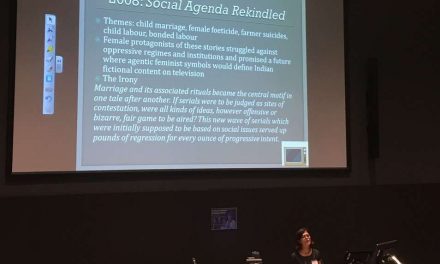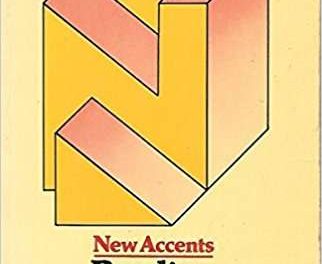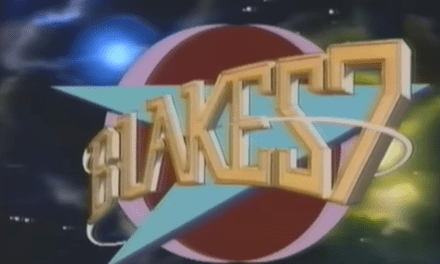
Last week represented the culmination of over a year’s worth of organization. The ‘Doctor Who: Walking in Eternity conference’ ostensibly kicked off the academic round of 50 years of Doctor Whocelebrations which will culminate in an anniversary special on 23rd November this year.
I originally had the bright idea of holding this conference as a new member of staff at the University of Hertfordshire in the Creative Arts Department. Within a month or two of starting one of my colleagues (Howard Berry) held a 48th anniversary symposium, bringing together various personnel that had worked on the programme, including a Dalek, Mat Irvine and K9 and Kevin Jon Davies (Director of Thirty Years in the TARDIS), in a celebration of the show that had initially scared children into hiding behind the sofa. Me included.
That day got me thinking … I knew that there was already a great deal of scholarship focusing on the Doctor Who phenomenon, indeed the Reading Contemporary TV series had commissioned an edited collection on Doctor Who, and Dr Lorna Jowett had given a rip-roaring paper at the symposium focusing on the companions in the series. Why not hold a 50th anniversary conference, bringing together as many scholars as possible to ruminate, investigate and celebrate fifty years of The Doctor?
Leaving aside the logistical nightmares involved in organizing a three-day international conference, I always knew that Doctor Who was special. I.B. Tauris were in the midst of launching their ‘Who Watching’ website, gathering together all of the books that had been published by them under one roof (or url), Matt Hills (Triumph of a Time Lord) was editing a collection for the Reading Contemporary TV series that would bring together ‘Who’ scholars in a celebration of 50 years of the Doctor – New Dimensions of Doctor Who – and James Chapman was updating his classic study Inside The Tardis: The Worlds of Doctor Who. There was certainly a lot of interest in the series.
The Call for Papers attracted an overwhelming number of Who scholars. Although I knew that a series that had migrated to the US would attract an international audience, I was not quite prepared for the amount of people writing on the subject. From subjects as diverse as the music in the series, its science-fiction credentials, the Time Lord himself (and his many manifestations), the companions, the TARDIS and the monsters, gender in the series, the US influence (both back and forth), the history of Doctor Who, its placing within the Public Service Broadcasting ethos, through to close textual readings of particular episodes, the array of papers was awe-inspiring. And so was the level of engagement, the energy and commitment of Walking in Eternity’s participants, with delegates coming from as far away as Australia, New Zealand, North America and Europe. Not only giving papers but just coming along ‘for the ride’ to be present at such a large gathering of Who experts and fans, scholars, academics and enthusiasts.
This blog is not a conference report. One, already written by Ross Garner (Cardiff School of Journalism, Media and Cultural Studies) can be found HERE, and another, written by Darren Elliott-Smith from the University of Hertfordshire, will soon appear on this website. Instead, my focus here is on what a humbling and enriching experience I found the three days that I shared with Who scholars.
I am regularly daunted by the sheer amount of hours it takes to study television. Many series are made up of nearly 100 hours of action. Narratives span years, if not decades. The ending of series often refer back to story arcs begun a decade before in the pilot. There are inter-textual references, self-reflexive moments, other TV series are referred to and watched. Who could forget this moment from The Sopranos, for example:
Historical moments are witnessed through the eyes of characters (Mad Men has made this into a trademark – we have watched both Kennedy assassinations and the death of Marilyn Monroe through the eyes of its characters and barely a week goes by without the use of archive footage within the series). Whole epochs pass by. 9/11 indelibly marked Sex and the City, The Sopranos and The West Wing, each series dealt with the tragedy in its own way (even if it was to gloss over the event), before moving onto embrace the post-9/11 landscape as seen through the eyes of its characters.
And I am only now talking about a small portion of television that I have attempted to write about over the past decade or so. Just over ten years of television scholarship that not only reveals much about the way US TV has changed since the end of the last century but how we talk about and study it – the explosion of television channels, viewing habits, digitized delivery and audience expectations among the many ways of studying and enjoying television into the 21st century.
Our celebration of Doctor Who embraced this multi-disciplinary approach. There were scholars from every subject specialism imaginable. Neuro-scientists, cultural theorists, sociologists, Film and English scholars, journalists, media theorists, as well as pure television scholars – if there is such a thing – with most of us having come from other disciplines in the first place (much like film scholars came from other disciplines in the early days of Film Studies). And let us not forget the astro-physicists who later confessed that they had ‘bunked into’ our conference as some of the panels looked so much more interesting than their own.
Despite reservations at the last panel, with Matt Hills among others worrying about the dilution of television studies as a discipline through a ‘Rag, Tag and Bobtail’ approach, it was this merging of minds and specialties that made the Doctor Who conference so special. While some television studies scholars laud a single approach, elevating one style of scholarship over another, the sheer diversity of approaches at ‘Walking in Eternity’ unlocked the text as never before and proves that there is much to be gained by opening up the field in this way. Textual analysis sat alongside discussions on the use of space and place within the series, historical readings jostled with industrial approaches, cosplay and gaming happily co-existed with DVD production papers. And all opened up the series to innovative readings that, while acknowledging the televisual nature of Doctor Who and its history as a BBC product did not close down meaning to a simple, one-dimensional approach but embraced multifarious ways of reading a 50-year-old text.
Over the course of three-days we never forgot that the series began in 1963, shot in black and white, with wobbly sets and risible monsters. After all, it can only be truly understood when considered (as John L. Sullivan (Muhlenberg College) did so eloquently in his paper ‘Transporting Television in Space and Time: The export of Doctor Who to the United States in the 1970s and 1980s’) as a BBC children’s programme, subject to the vagaries of Public Service Broadcasting.
My point is that Who scholarship has only really just begun, a point made by Matt Hills in the closing panel of the conference: Doctor Who maybe 50 years old but the scholarship around it probably spans only 10. Since March 2005 and under the helm of Russell T. Davies, the ‘new Who’ has transmogrified into a stylish, compelling drama, attractive to both adults and children, with another doctor (Peter Capaldi) entering the fray in the next few months. Consider coming to this series late in the day. While I bemoan the fact that I am still playing catch up with Breaking Bad finishing its run before I have even got to the end of season 4, new Who fans are faced with 33 years of back episodes to watch. Eight doctors, goodness knows how many companions (if you know how many please feel free to tell us in the comment box at the end), countless monsters and myriad planets and crisis to attend to and solve. In the first tranche of Doctor Who alone the series has aired alongside five prime ministers (Harold Macmillan, Alec Douglas-Home, Harold Wilson, Edward Heath, James Callaghan and Margaret Thatcher). Indeed a fine paper was given by Richard Wallace (University of Warwick) – ‘The Sound of Empires Toppling’: Politics, Public Service Broadcasting and Doctor Who – which focused on how (whether) Thatcher’s years impacted on the series with some wonderful examples of how Sheila Hancock’s villainess was influenced by the Iron Lady.
I feel weak at the thought of coming new to this canon. And yet, over the course of three days last week in Hatfield, new scholars came to the table with their own personal take on the series, both old and new. A daunting task in itself.
I would like to think that everybody took something away from the experience. Me? I learned a lot. Firstly, while everyone was talking about their first Doctor, I seemed to be the only person whose first doctor was the first Doctor. Secondly, I realized that I am not so much a Doctor Who fan, (Steven Moffatt has certainly seen to that over the past year with his queer baiting and misogyny proving too much for me to stomach), but I have literally grown up with the Doctor. Fandom does not adequately describe my relationship to Doctor Who. I remember the Tom Baker years with affection (and yes, Brigid Cherry, I too knitted a scarf).

I watched the Jon Pertwee years not least because Katy Manning was just so damn cool. I have watched the series as a child with my father (William Hartnell, Patrick Troughton, Jon Pertwee and Tom Baker) with my son (Sylvester McCoy), my daughter (Christopher Eccleston, David Tennant and Matt Smith) and will no doubt watch Peter Capaldi’s doctor regenerate with my adult and adolescent friends and family.

Put simply, growing up in the UK since the late fifties it has been hard not to have felt the impact of Doctor Who and it is in that vein that I am glad that all of our delegates celebrated a TV series that has survived where others have not.
A British one to boot.
Postscript
Even though this is not a conference report I am moved to say that not only did the multi-disciplinary approach yield some fine readings of the series but that the scholarship was of an incredibly high standard. The sheer variety of papers made for some thought-provoking panels. Of course, the papers on gender particularly appealed to me, as did the ones looking at the television industry itself. The keynotes deserve particular mention as each of them gave thought-provoking and inspiring papers. James Chapman laid out the history of the series at the beginning of the conference, David Butler brought a stunning sound installation from the Delia Derbyshire archive, Matt Hills investigated the nature of the television anniversary, Lorna Jowett (who moved me to tears) with a stunning paper on the misogyny embedded into Doctor Who (both before and behind the camera) and last, and by no means least, David Lavery who postulated what an American Doctor Who would look like.

Thank you to everyone who took part.
Kim Akass is a Senior Research Fellow and lecturer in Cutural and Contextual Studies (Film/TV) at the University of Hertfordshire. She has published widely on US TV, is co-founding editor of Critical Studies in Television and is co-editor (with Janet McCabe) of The Reading Contemporary TV series for I.B. Tauris. She is currently working on a book about mothers in the media for I.B. Tauris and is webmistress of CSTonline.





